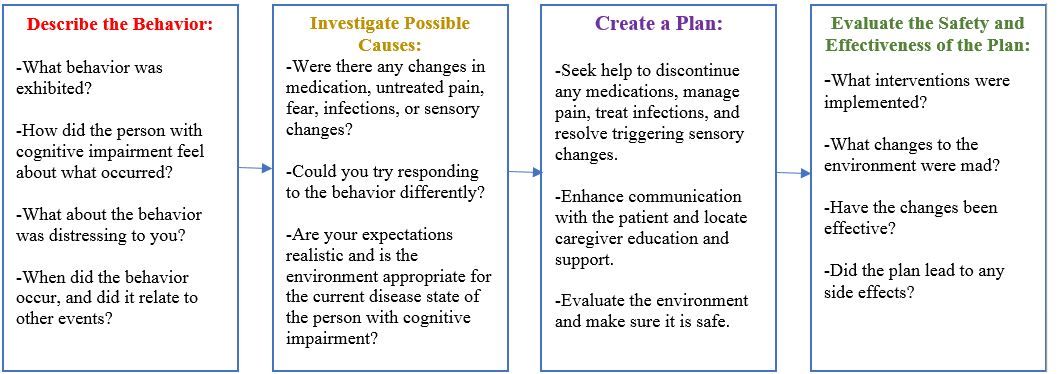
As dementia progresses, individuals can experience behavior and personality changes. These often arise because the person is losing cells in areas of their brain which control their impulses or ability to focus. Behaviors like anger, aggression, or agitation may also surface because of a physical discomfort or environmental factors that the individual with cognitive impairment is unable to communicate. Behavioral and personality changes can be particularly challenging for friends, family, and caregivers as their loved one seems unlike their normal self, but it is important to meet these changes with patience and compassion.
Tips for Responding to Common Behavior Changes
The DICE Method is designed to aid in the management of behavior and personality changes due to dementia. The four steps are Describe, Investigate, Create, and Explore.

For Caregiver Behavior and Habilitation Training Videos Visit:
Support Groups in your Community
- The District of Columbia Caregiver Institute provides resources to DC residents including in home assessments, support groups and education. For more information please click here and for information about support groups and how to get involved, please click here.
- Online and In-person caregiver support groups can also be found at:
Caregiver Health Self-Assessment Questionnaire
This questionnaire can help caregivers evaluate their own behavior and personal health risks. If your results indicate that you are experiencing a “high degree of stress,” please notify your Memory Clinic Team to provide a more comprehensive assessment:
Finding Additional Care and/or Respite
- Consider Adult Day Healthcare Programs
- Check with Your Local Office on Aging
- Check with Your Local Village
- Consider a different level of care through alternative living options:
- Please contact your Memory Care Team for support and additional information if you are in need of additional help.
Recommended Caregiver Reading List
- Online Reading Guides:
- Team Member Favorites:
- The 36-Hour Day by Nancy L. Mace
- Creating Moments of Joy for the Person with Alzheimer’s or Dementia by Jolene Brackley
- Learning to Speak Alzheimer’s by Joanne Koenig Coste
- Living with Dementia: A Practical Guide for Families and Personal Carers by Esther Chang and Amanda Johnson
- Being My Mom’s Mom by Loretta Anne Woodward Veney
- Tangles: A Story About Alzheimer's, My Mother, and Me by Sarah Leavitt
- Can't We Talk about Something More Pleasant?: A Memoir by Roz Chast
